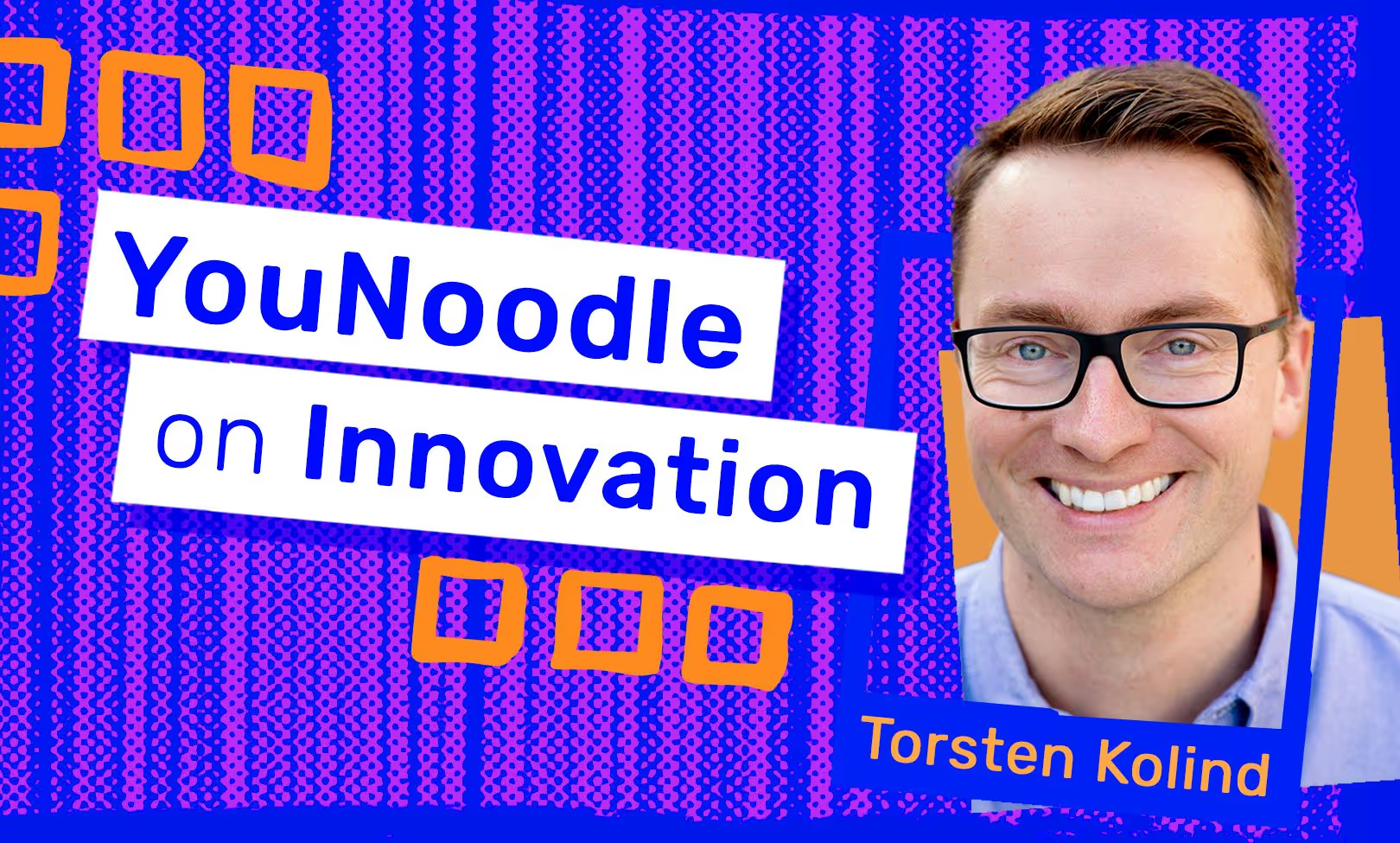
From Silicon Valley to the Nordics: Innovation Should be a Matter of Urgency
What if the secret to innovation isn’t just about thinking outside the box, but realizing the box is on fire? In a candid conversation with Torsten Kolind, co-founder of YouNoodle, we uncover why he believes urgency—not comfort—fuels progress, and how a looming sense of crisis can be the unexpected trigger for reinvention. From the fast-paced pressure cookers of Silicon Valley to the cautious explorations of the Nordics, this is a story about disruption, survival, and finding tomorrow’s business model today.
Interview with Torsten Kolind, the CEO and Co-founder of YouNoodle.
“True innovation comes when everyone is involved and invested”
YouNoodle founders, Rebeca Hwang and Torsten Kolind, are on a personal mission to level the global playing field for startups. As part of this journey, in 2010 they launched a platform helping companies source, select and engage the most promising startups in the world. Today, YouNoodle helps corporates to execute startup and innovation programs at scale. Booking.com Booster, Cisco’s Innovation Grand Challenge, Stanford BASES startup competition, and Salesforce Accelerate are just a few examples of innovation powered by YouNoodle.
I met Torsten when he was hosting the Corporate x Startup Summit at Techfestival 2019 in Copenhagen. We sat over a cup of coffee to talk about his experience in Silicon Valley, internal vs. external innovation, the benefits of the crisis and some of the learnings from failures at YouNoodle.

Aukse: Torsten, where does your story start?
Torsten: I moved to San Francisco about 10 years ago and I moved because I got a job opportunity by a local startup there. I was at a conference and I was really fascinated about what they did and all of a sudden, they asked if I could join them on their team over here.
So, I did and was there for about two years and learned a lot of stuff and then found YouNoodle, my current company, with one of the other early employees of that company.
So, we essentially left and found YouNoodle in 2010. So, that's really been a journey and that's what I do today.
A: What is YouNoodle?
T: YouNoodle is a platform for entrepreneurs and startups that are being sourced into different programs. These could be grant programs run by the government or it could be innovation challenges run by larger corporations. It's the biggest platform of its kind and I think over the nine years, we have evolved in different stages and have now really found our niche as a startup sourcing and selection platform.
A: Would you say you present companies with an alternative to the traditional “internal-innovation” way?
T: Some people use YouNoodle for discovery. They are in the very early phases of innovation and they are interested in what the startup world is doing in that space.
In that case, companies can launch a challenge on the platform and it allows them to solicit pitches of startups that are doing stuff with either technology they're interested in or in the space or market they're interested in.
Companies that are much more in the development phase are looking for something more specific. For instance, you want a solution to a particular problem. Then, you have to make a choice of whether you're going to solve it internally or externally. In this case, YouNoodle is often being used to solicit external startup projects and technologies that are already well-developed and loop them in. Sometimes these startups become investment objects.
But oftentimes, companies just form commercial partnerships, acquire technology licenses or the startup becomes a vendor of that company. So, the engagement varies a lot but that's an example of the later phase, where companies say: “I know what I'm looking for. So, give me the startup that has done this already that I can work with.”
A: Since you have the advantage of two very different backgrounds, it would be interesting to hear your personal opinion on this. Do you think companies think or act on innovation differently in Silicon Valley than they do in Denmark?
T: Yeah, we are based in America and when we deal with US customers we're typically seeing a more defined need and outcome. They are saying–“We're looking for you to do this, by this date.” Whereas, working with Nordic companies is much more exploratory–“We know that there might be some cool startups, we are interested, but we're not really ready yet, so just tell me a little bit about what you do.” It is a very long process of back and forth.
I think the American companies just have a stronger push from the market; they are under more competitive pressure. So, they don't have time for that long discussion with everybody about what to do. They have a sense of urgency and I think the Nordic companies often lack that sense of urgency.
“Every day, month, year that goes where you don't find tomorrow's business model, you are a step closer to death by disruption.”
A: Do you think the urgency is needed?
T: Yeah. I think it is needed. Every day, month, year that goes where you don't find tomorrow's business model, you are a step closer to death by disruption.
That is unfortunately how it works. If you don't have tomorrow's business model, somebody else is going to compete with you and that's not just America. There's a lot of other places in the world where people are a lot more in a rush to move things forward.
I particularly see that in a lot of the Nordic companies that are world leaders in a very specific niche. That's a typical thing–you're just amazing at doing this one hardware thing or this one drug. I think that sense of “Oh, we're the best in the world”, gives Nordic companies a sense of arrogance in terms of other solutions and other alternatives. I think it is a very dangerous place to be for an organization. American companies don't have that because they always feel this constant pressure. So, they know disruption is out there and that they need to act on it.
A: Does a company need to have a specific company culture to be good at innovation? Do you see a common thread there?
T: Yeah, I think it generally helps that it's coming from the top-down more, than the bottom-up. The reason for that is that if people don't have the buy-in from the higher-ups in the system, it's not going to move anywhere because it's not the goals of the company.
Top-down innovation is especially powerful if the company has been through a crisis. An example of that is Nokia that went through a massive crisis and for that reason no one at Nokia says “Oh, we're doing fine. We're number one today, right?.” You laugh but it's different from a lot of other companies.
I think some of the companies we work with in the US have also had the experience of going through a crisis. That usually means that they're just less arrogant and would have a higher level of humility towards new innovation, whether it’s coming from the inside or outside. That is not just a willingness to try new things but the necessity.
"One of those powerful ways to get there is through a crisis."
A: Do you mean a necessity to prioritize innovation?
T: Yes, we have to try new things, otherwise we're screwed.
One of those powerful ways to get there is through a crisis. What I worry about, whenever I'm back in the Nordics, is that I see a number of companies that are likely to be going through such a crisis over the next maybe five years and that will come at a great cost.
A lot of people will lose their jobs. A lot of tax revenues will be forgone in these countries. Leadership is not strong enough in these companies to drive the actual change before such a crisis starts. So, all I can hope for is that not all of the top 20 companies in Denmark have a crisis at the same time, or all the top companies in Sweden have a crisis at the same time.
I think that's what one can hope–that they have crisis one-by-one, and that each of them will come out of it with a sense of urgency and a sense of humility in terms of new innovation.
“When you solicit ideas or input internally, you get predominantly problem areas that are important. When you solicit things externally–you get predominant solutions that are important.”
A: Do you have any specific tips for companies that are just starting with innovation?
T: Yeah, where do we even start, right?
I think, first of all, my experience with internal versus external innovation is that when you solicit ideas or input internally, you get predominantly problem areas that are important. When you solicit things externally–you get predominant solutions that are important. And it's not that you only get one or the other, but generally, I find that employees are really good at pinpointing areas where we have an issue, but they're rarely very good at suggesting a better solution than let's say the startup world.
A: So, would you say the solution is a combination of both?
T: Yeah, that's definitely what I recommend in general to our clients is that they use a combination of internal and external innovation and they need to know when to apply which.
A: Do you think there's a point in business development where the company is ready for external innovation or is it something you can start from the beginning?
T: I think honestly, it's kind of the other way around: the smaller the business, the earlier the businesses–the more ready they are. Because when you start a business and it's just you, everything that you don't do yourself–other people will be doing. You're probably in a co-working space, so there are people watering your plants and making your coffee–all the stuff that later on, in business life, you do internally.
So, you are extremely open as an entrepreneur and as you then built out your own team and business processes you get more and more closed. So, you can essentially see it like that–the bigger the company is, and the older the company is, the less ready it is for certain work.
A: Interesting.
T: However, as it grows and gets older the need for external innovation goes up. So, the readiness goes down, the need goes up.
A: Sounds like a challenge, right?
T: You’re in your business and I’m in mine –that's absolutely a problem. Of course, you can act to get the company ready. But as I said, there's nothing as good as a proper crisis when you have to fire a third of your company in terms of getting that ready. Unfortunately, that has a very high cost to society. So, I'm hoping we don't all need these crises but it will come one way or another [laughter].
“Allow each member of the team sufficient freedom both in terms of the rules you have, but also the resources they have available–their own time and what's asked of them.”
A: Zooming in on you as a CEO and YouNoodle in general, what do you do internally to keep on top of innovation and stay disruptive?
T: I think in a small company, you don't have all these processes set up, so the best thing you can do is through culture. It is to allow each member of the team sufficient freedom both in terms of the rules you have, but also the resources they have available–their own time and what's asked of them.
Sufficient freedom to be exploratory and openness for new suggestions and ideas. As a CEO, you always push that agenda because if you don't push that agenda (and I'm very open to new suggestions and ideas), people will just get used to normal ways of doing stuff, like in any other company.

So, you have to really push people and remind them that you want to hear not just ideas of how to change stuff, but also you want to hear about problems.
Everyone should feel great about telling us that something is not working and that also means an openness to making mistakes. We have employees in five different countries and there are some cultures that are much less comfortable with making mistakes. So, I have to keep reminding them that they can come and talk to me and tell me that this didn’t work. It’s not a problem. I'm not going to be mad at you. I would like to know that this didn't work, even if that is the employee's fault. I think it is a responsibility you have as a founder and CEO, to actually make that point and not just assume that people know it.
A: Yes, I think that's a wonderful culture to have, do you think that's a standard in Silicon Valley–a work culture with sufficient space and freedom to innovate?
T: I definitely think there's it's a standard that companies are open and allowing you to make mistakes. We actually have a board on the wall of our office that says “Make mistakes.” [laughter]
I mean it literally and I think that's very comforting. It actually comes from the startup world. The big Silicon Valley companies were all startups once and not too long ago. Startups definitely have this notion of “failing fast” which means making attempts to solve what you want but also, if it doesn't work, don't hang on to it for two years. Kill it the minute it doesn't work and spend all your time and resources on other stuff. So, the “fail fast” notion is very common also in bigger companies.
A: I really like that emphasis you put on the failures and learning from it. I was wondering, do you have a “famous” mistake in your company which made you change some of the processes in the company?
T: We failed a number of times and I've definitely been responsible for some of it myself. We tried to do a very ambitious almost like social network version of You Noodle.
Today's You Noodle is very much an operational platform; it helps people execute startup programs. But at the beginning of the company's life, we thought it'd be really cool to have a social network timer platform where startups and founders could find all sorts of resources. They could find co-founders. They could find investors. They could find their first employees. We set this whole thing out and we spent a lot of time building that out and we just got it wrong. It didn't actually work.
There’s a long story of why it didn't work. And that meant I had people that worked on that for close to a year and I just had to throw it all out of the door, and it was my decision to do so. That's a pretty big failure.
In many cases that leads to the end of the startup. The startup doesn't have that much buffer. You make a big mistake like that and you just die. Then, the good thing is that everybody can go and start other companies. But those startups that make it, they build a little bit of resilience that allows them to go through failures and I think that's the case in our situation.
A: Thank you for sharing that. It was great talking to you, Torsten! Thank you for your time.
T: Thank you!
Hungry for more?
This blog post is a part of our new interview series–Debunking Innovation, where we introduce our readers to the many faces of innovation, ideation and everything in between.
Debunking Innovation strives to get down to actionable tips and tricks that you can apply in your team and get better at bringing new ideas to life.
Next up to Read:
Turn Urgency Into Action with Ideanote Today




